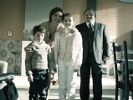Eye For Film >> Movies >> Kafka's The Burrow (2014) Film Review
Kafka's The Burrow
Reviewed by: Luke Shaw

Adapting Franz Kafka’s paranoid work into film presents any team of director and writer with numerous challenges, not least the problem of getting the audience into the headspace of one of his anonymous characters. His novels function by making the quotidian subversive, the regimes and regularities of life taking on a sinister edge through his narrators' slow spiral into madness and perceived persecution.
The solution is definitely not to have your protagonist artlessly regurgitate Kafka’s writing verbatim, a cardinal sin that is rife in Der Bau. A little metaphorical hoop-jumping isn’t too much in a film like this, as the original text is smartly re-imagined, with the mole-person and the earthy tunnels of the original replaced by a working man and the routines and personal spaces that he has carved into the world. So, with such a drastic shift of setting, it feels remiss to provide narration and soliloquy that do little to fit the new dressing.

This primary failing is reinforced by how rigorous the attention to the prolonged decay of our protagonist’s world is. Besieged on all sides by encroaching noises, detritus, and vagrants, his gleaming penthouse apartment eventually becomes covered by the rotting patina of a ruined world. Little context is given to why these events are happening, or whether they are literal or figurative, but the buildup of clutter over the course of the film is its most appealing visual metaphor. It fits the oppressive tone of Kafka, and it lends a dark humour to the proceedings as Franz attempts to secure his personal fortress from the outside world, and the futility of him binning the odd bit of garbage when an upturned car and listless drifters insert themselves into his habitat.
As Franz’s rational systems break down, his paranoia grows, but the film handles this clumsily by making his family a hallucination without developing them enough to have this feel like a smart twist. Shadowy figures running behind his back and across open doorways top the list of cliches that undermine the intelligence and the hard work the rest of the film does to adapt the abstractions of a literary work into a feature film.
Humour is sparse but as black as a beetle's shell when it does occur, and the ending shows a real commitment to the vivid language used throughout the rest of the film, but it’s drowned out by the pointless mumblings of a man who never really gets the audience to believe in the rationalisations of his eccentricities, which is where the power of the original work really lies. It’s a shame, as there’s some excellent textural work here, but no amount of surface detail can smother the pretense.
Reviewed on: 17 Jun 2015















